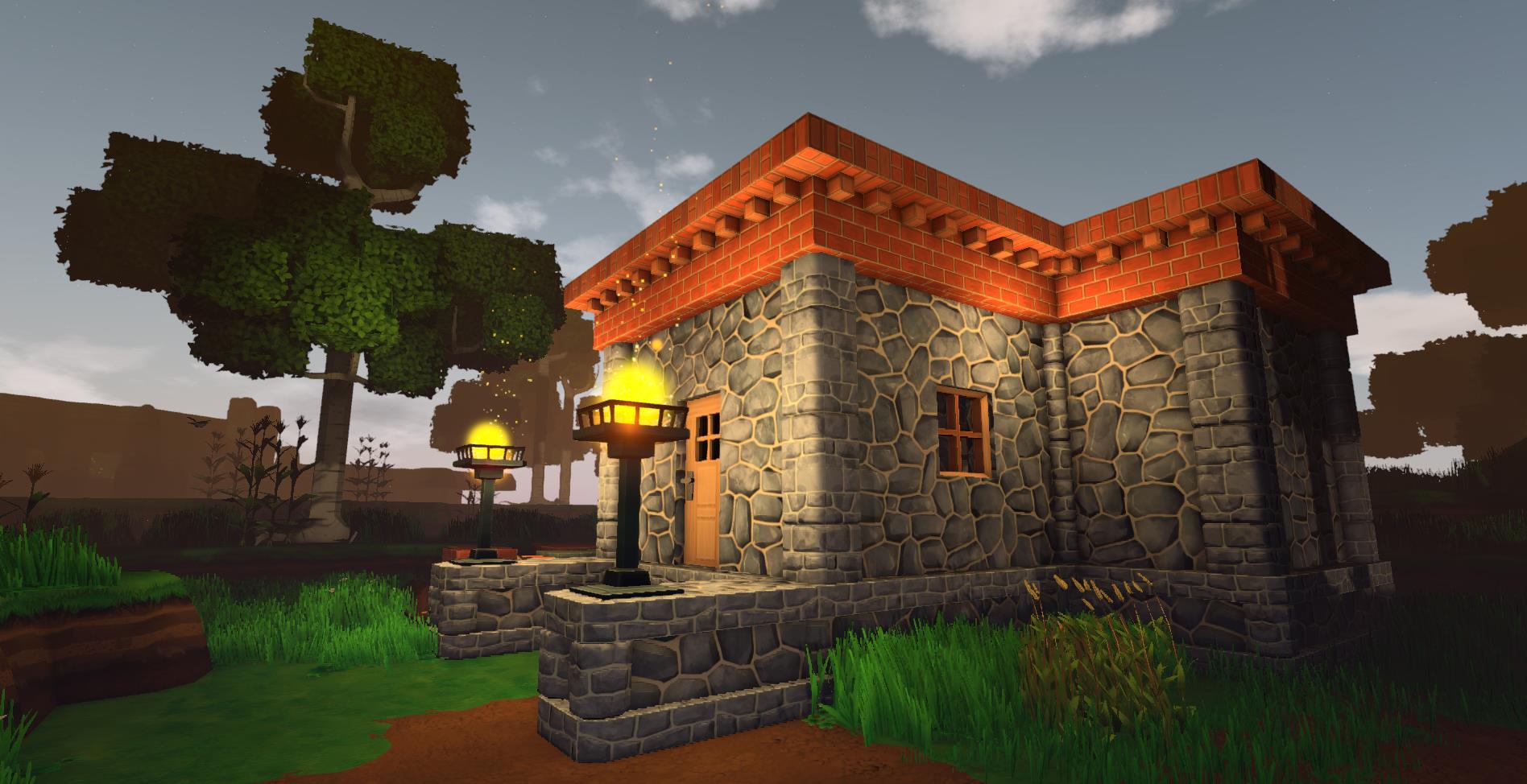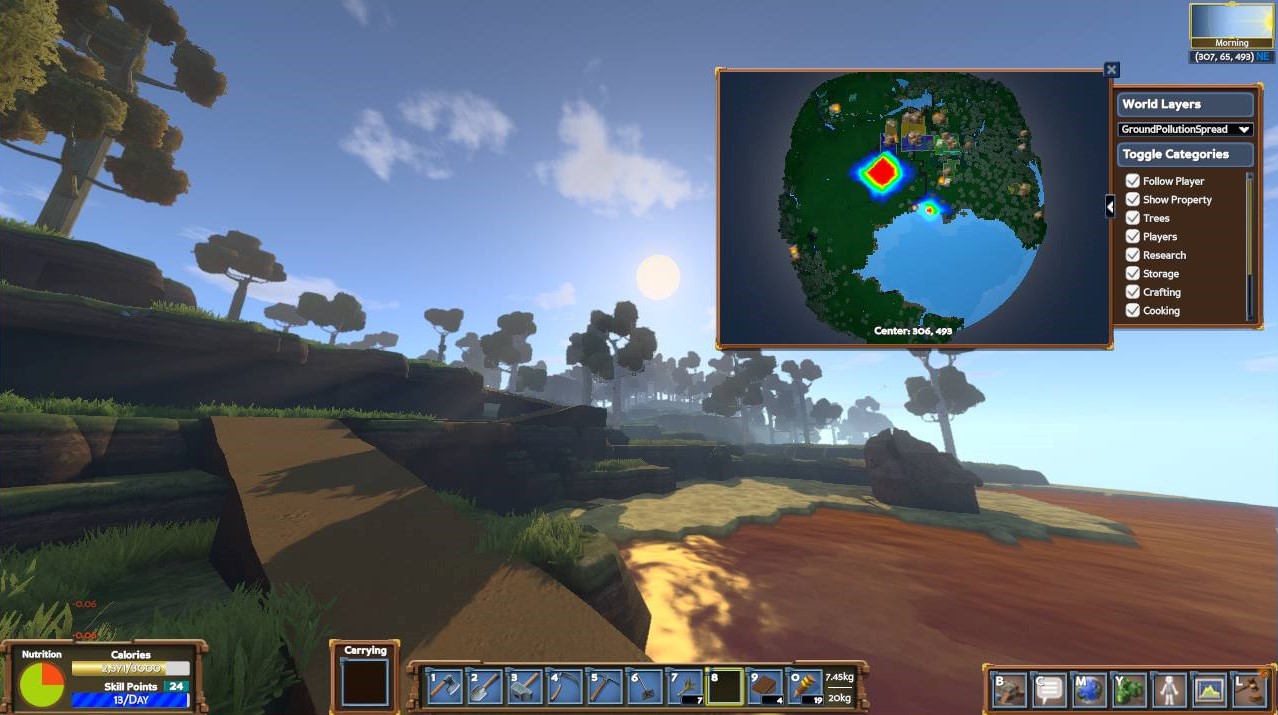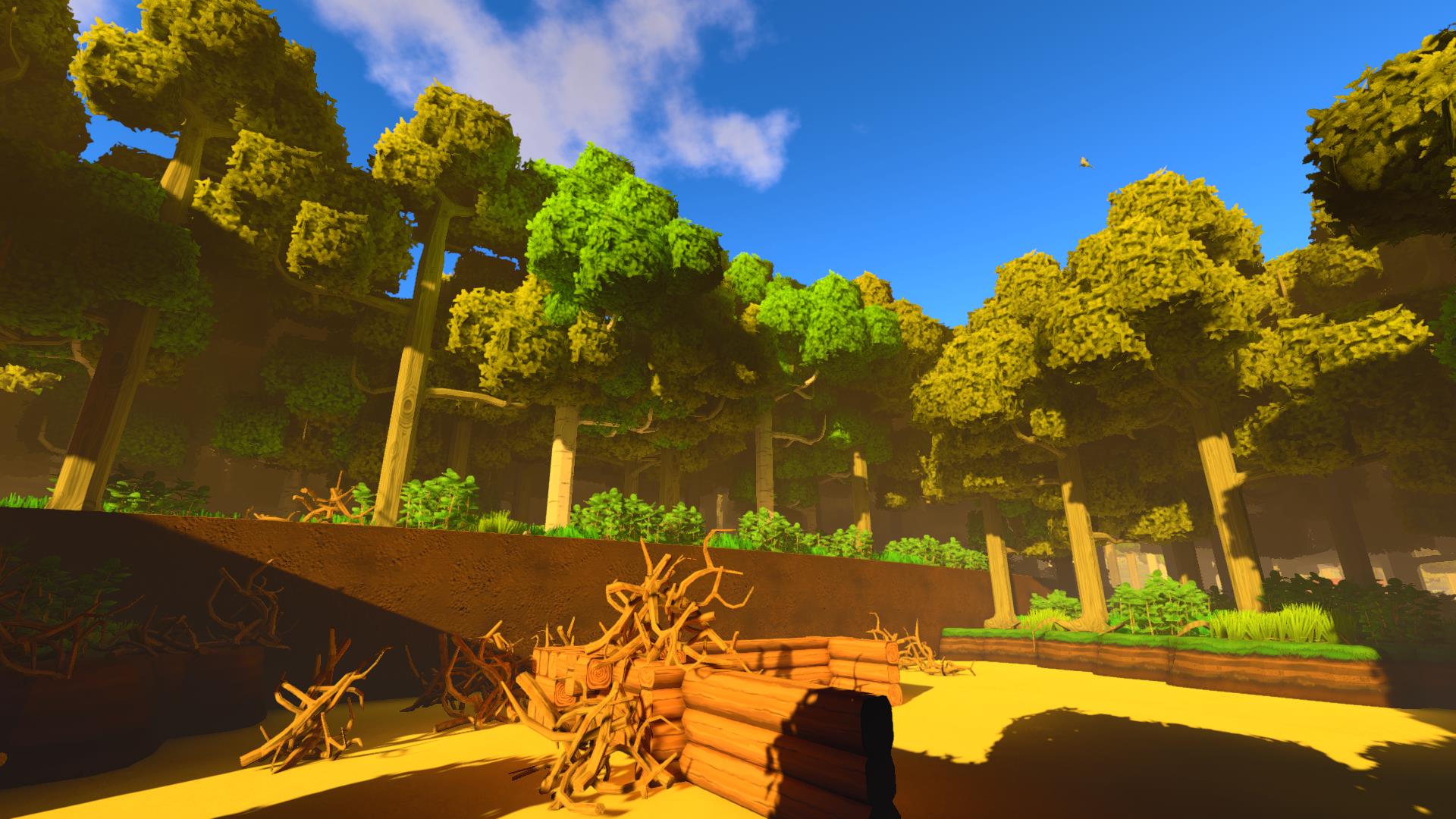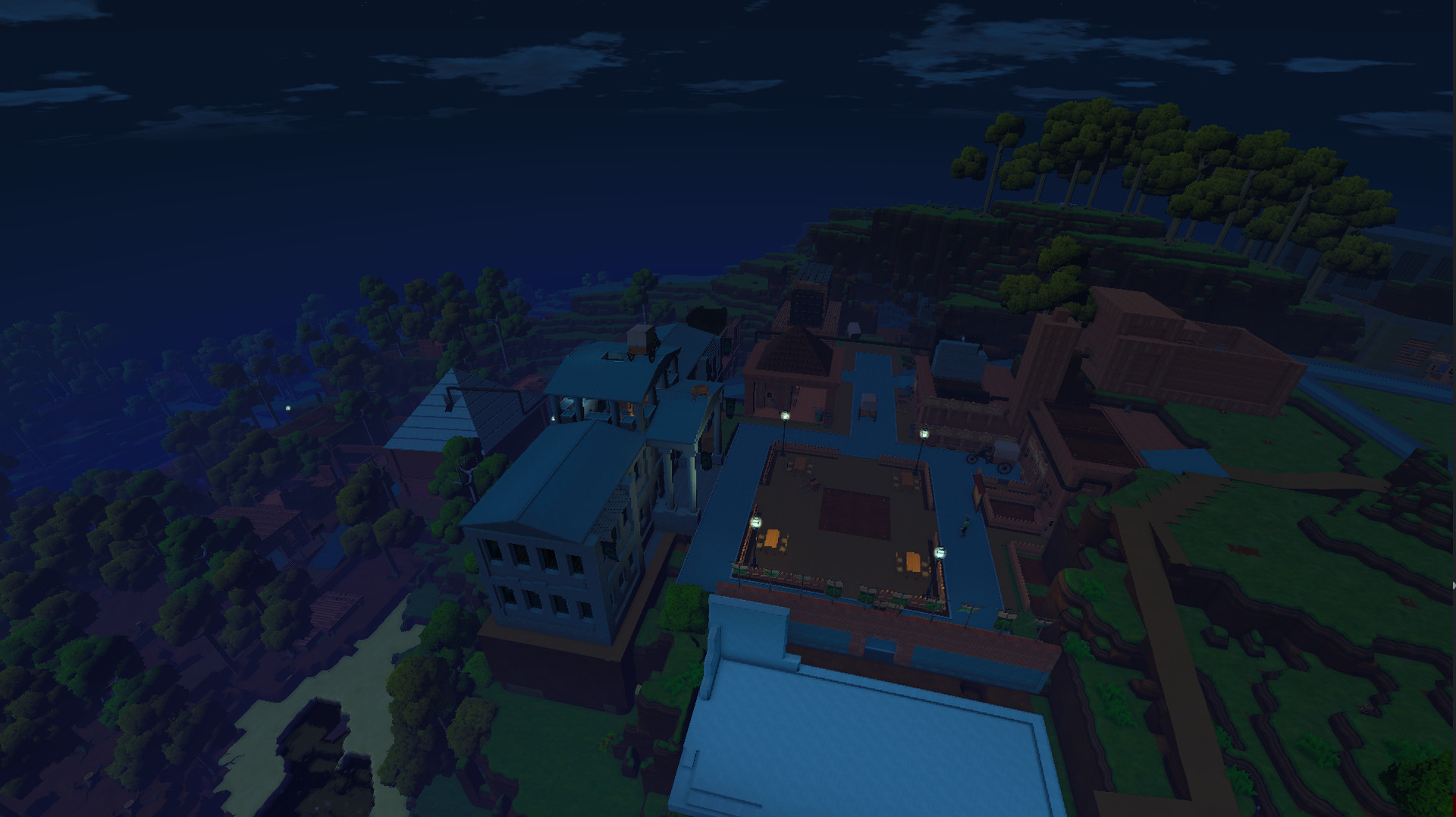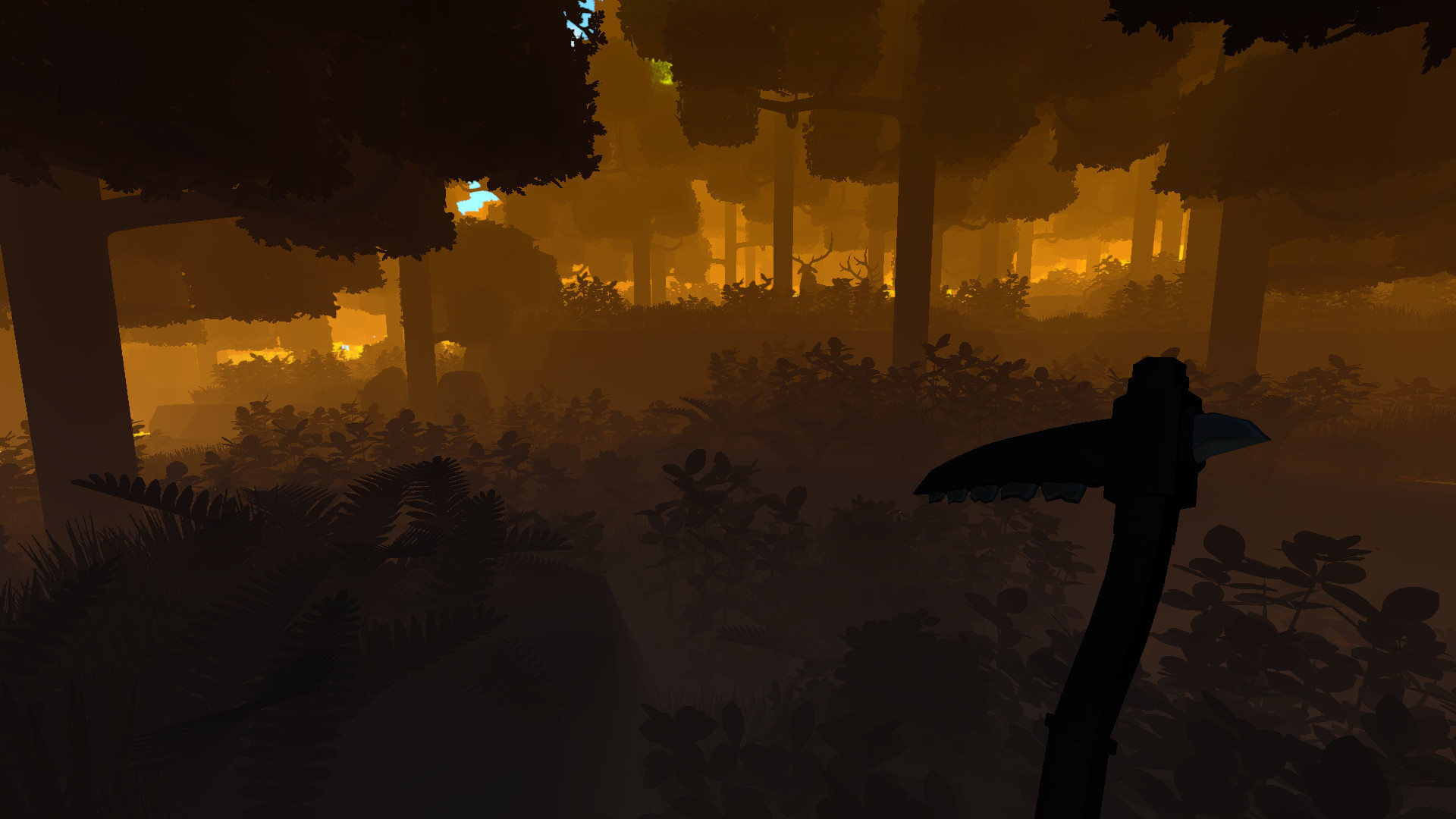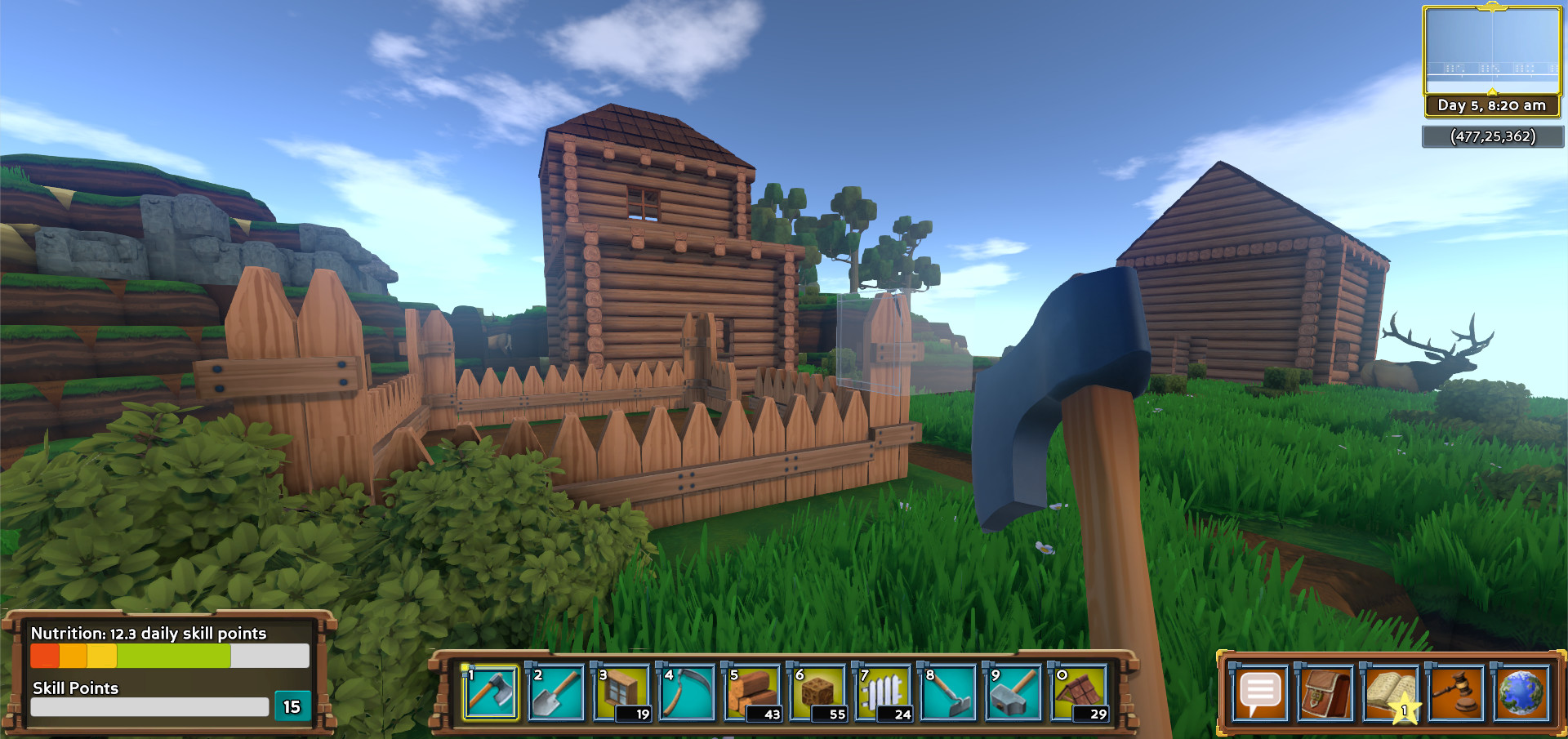Enter the world of Eco, where you must team-up to build civilization and prevent a disaster, using resources from a fully simulated ecosystem, where your every action affects the lives of countless species.
Will you and your fellow builders collaborate successfully, creating laws to guide player actions, finding a balance that takes from the ecosystem without damaging it? Or will the world be destroyed by short-sighted choices that pollute the environment in exchange for immediate resource gains? Or, do players act too slowly, and the world is consumed by a disaster that could have been avoided if you developed the right technology? In Eco, you must find a balance as a group if the world is to survive.
Enter humans into this equation, and things get complicated. It is the role of players to thrive in this environment by using resources from the world to eat, build, discover, learn and invent. However, every resource they take affects the environment it is taken from, and without careful planning and understanding of the ecosystem, lands can become deforested and polluted, habitats destroyed, and species left extinct.
In the extreme, the food supply of the ecosystem can be destroyed, along with all human life on it, resulting in server-wide perma-death. Eco is a game where the player’s actions have meaningful consequences.
Will you and your fellow builders collaborate successfully, creating laws to guide player actions, finding a balance that takes from the ecosystem without damaging it? Or will the world be destroyed by short-sighted choices that pollute the environment in exchange for immediate resource gains? Or, do players act too slowly, and the world is consumed by a disaster that could have been avoided if you developed the right technology? In Eco, you must find a balance as a group if the world is to survive.
A world-survival game
Eco is a survival game in a global sense, where it is not just the individual or group who is threatened, but the world itself. The world of Eco will be home to a population of thousands of simulated plants and animals of dozens of species, each living out their lives on a server running 24 hours a day, growing, feeding and reproducing, with their existence highly dependent on other species.Enter humans into this equation, and things get complicated. It is the role of players to thrive in this environment by using resources from the world to eat, build, discover, learn and invent. However, every resource they take affects the environment it is taken from, and without careful planning and understanding of the ecosystem, lands can become deforested and polluted, habitats destroyed, and species left extinct.
In the extreme, the food supply of the ecosystem can be destroyed, along with all human life on it, resulting in server-wide perma-death. Eco is a game where the player’s actions have meaningful consequences.
- Everything you do affects the ecosystem, and players can destroy their food supply and world (server-wide permadeath)
- Create a player-run government to make decisions as a group, proposing and voting on laws
- Use data gathered from the world to propose and vote on laws as a group. Debate with scientific argumentation.
- Create a player-run economy that allows you to sell not only good but services in the form of server-enforced contracts (simulating a player driven quest system).
- Your food level determines your skill-increase rate, making food very important and tying players directly to the ecosystem from which it comes.
- A game with goals higher than entertainment. We plan to build it for schools as an augmented classroom world students share.
Developer Blog: Elections and Elected Titles in Update 9.0
New Government system: Constitution
New Government system: Elections and Elected Titles (This blog) New Government system: Demographics and Wages New Government system: Laws Part 1: Using the system New Government system: Laws Part 2: Taxes, Ownership, Property, and Wealth New Government system: Laws Part 3: Tour of different actions, and Executive Actions New Government system: Districts New Crafting: Work Parties New Crafting: Labor System New Crafting: Modules and Efficiency Redesign New Crafting: New Tech Tree New Building System: Hammer and new Building Styles New Mining System: Mineral Dispersion and Drill Usage New Mining System: New Processing Path and Pollution Info New Animal System: Attacking Animals New Ecopedia System New UI New Audio New Hosted Worlds System[/olist]
Elections are one of the most fundamental parts of a democracy, and with 9.0 we're adding a lot of flexibility for how they can be used (or not used at all, if youre more into the dictatorship thing). Prior to Eco 9, elections in Eco were only used to elect the World Leader with 9.0, they can be used to make virtually any civic decision as well as elect player-defined Elected Titles. This means no more single world leader, but potentially a whole slew of different elected leaders, each with different responsibilities. Polling the populace can now be a core way that a world makes decisions.
Elections are tied to Civic Actions, which are things Citizens can do that affect the government, in a way defined by the Constitution (see last weeks blog ). An example of some of the civic actions you can perform in the game: Add, change, or remove a civic object (law, civic article, demographic, elected title, election process, etc). Perform an Executive Action (ie, tax all players with time in world > 5 days). Remove a leader from office
Elections are started automatically based on the rules of the Constitution. The constitution sets which actions need an election to pass, and who can propose it. Every civic object contains a handy list of what privileges you get from the constitution at the top, so you can always tell what youre able to do, in the form of your civic duties:
Here's what your civic duties might look like on a court, for example:

You can see it outlines all the things you can do there, as well as the articles of the constitution that give you that right.
You can also see all your civic duties for every type of civic object in the government menu:

Then when you edit a law, it will go to election:

From there, everyone gets notified in their new notification tab:

Then voting can happen by visiting any ballot box (or just going to the web ui of the server):


On the webpage, you can review the proposal, see the current votes and election details, and participate in discussions about the election.

Each election has a forum attached, where you can add graphs and maps arguing for your point of view. Arguments can easily be rooted in actual data from the world, encouraging citizens to formulate and debate using scientific reasoning.

Once the election is finished, the law will either pass or fail. If it fails, it can be edited and resubmitted.

Each Election Process defines a set of properties for how the election works, from basics like who can vote and veto, to advance rules like how often the election may occur.

As with every feature in Eco 9, weve added popup help text to everything, with the aim to create powerful features that allow for complex societies but are still easily accessed and understood by everyone.

Election Processes let you do cool things like design different tiers of government, creating representatives who are elected and then are permitted to vote on laws (you would create one type of election for choosing representatives, and another for letting them change laws). You can add protections in the form of vetoes that are limited to a subset of leaders, and determine how rapidly you want elections to happen and finish, balancing stability of government with adaptability to changing conditions.

Each position has a big set of properties that can be used to configure how the elected title works. You can pick the Election Process that elects the leader, decide who can run, requirements of candidates, etc. Positions can be held by multiple people, and a variety of privileges can be assigned to the office holders.
Here's a look at the properties that players get to configure:

You can see above that each position has special privileges to some government features, like adding global markers (markers in the world that everyone can see), setting tax rates in the treasury for things like sales, fees, and contracts, and creating and managing government bank accounts. Lots of power, which is wise to divy up accordingly.
Elected Titles can be specified anywhere you pick a citizen, and this is how you give special access to the leaders you choose. For example, we can go back to our election process described above and revise it to give this Minister of Finance special veto powers:

As you can see here, you can select options that are currently in a draft form, or under election, and if/when they become active they will automatically take effect in the new setting (but not before then). This allows you to compose a set of civic objects that reference each other and get them all passed simultaneously, instead of having to wait for them to each pass before you can set the next one.
Once the position is added, you can then start elections and enter them as a candidate from a ballot box:


Then let the campaign begin! Citizens can vote in the election at a ballot box in the same manner as described above:

The critical difference with elections for positions is that voting is performed using Ranked Choice Voting, which allows citizens to choose the order of preference of candidates, instead of selecting a single candidate. This has a number of positive effects on elections, especially when there are many candidates running: you dont have to commit solely to the candidate you think will win but can choose your favorite preference and select a separate one as your second/third/fourth/etc choice. Then if your main choice doesnt win, your vote goes to your next preference.
There are lots more civic objects that get added to the mix and make this even more powerful including districts, demographics, executive actions, and especially laws.
Stay tuned for future blog posts on them. Public playtests of Eco 9 are starting! Chat to D3nnis3n, our community manager in our Discord server if youre interested in helping out.
No stream this week, but expect a double feature next week. Chat soon and cant wait to see what people build with our new systems, and always feel free to send me and the team feedback.

- John K, Eco Designer, CEO Strange Loop Games

Hi citizens, our Eco 9 series continues with a look at Elections and Elected Titles:
[olist]
Elections

Elections are one of the most fundamental parts of a democracy, and with 9.0 we're adding a lot of flexibility for how they can be used (or not used at all, if youre more into the dictatorship thing). Prior to Eco 9, elections in Eco were only used to elect the World Leader with 9.0, they can be used to make virtually any civic decision as well as elect player-defined Elected Titles. This means no more single world leader, but potentially a whole slew of different elected leaders, each with different responsibilities. Polling the populace can now be a core way that a world makes decisions.
Elections are tied to Civic Actions, which are things Citizens can do that affect the government, in a way defined by the Constitution (see last weeks blog ). An example of some of the civic actions you can perform in the game:
Here's what your civic duties might look like on a court, for example:

You can see it outlines all the things you can do there, as well as the articles of the constitution that give you that right.
You can also see all your civic duties for every type of civic object in the government menu:

Then when you edit a law, it will go to election:

From there, everyone gets notified in their new notification tab:

Then voting can happen by visiting any ballot box (or just going to the web ui of the server):


On the webpage, you can review the proposal, see the current votes and election details, and participate in discussions about the election.

Each election has a forum attached, where you can add graphs and maps arguing for your point of view. Arguments can easily be rooted in actual data from the world, encouraging citizens to formulate and debate using scientific reasoning.

Once the election is finished, the law will either pass or fail. If it fails, it can be edited and resubmitted.
Election Processes
So the way each election works is also something that can be determined by citizens. In fact, the election process is simply another civics object that can be changed, either by fiat or election, depending on whats in the constitution. You can create these at a Board of Elections object:
Each Election Process defines a set of properties for how the election works, from basics like who can vote and veto, to advance rules like how often the election may occur.

As with every feature in Eco 9, weve added popup help text to everything, with the aim to create powerful features that allow for complex societies but are still easily accessed and understood by everyone.

Election Processes let you do cool things like design different tiers of government, creating representatives who are elected and then are permitted to vote on laws (you would create one type of election for choosing representatives, and another for letting them change laws). You can add protections in the form of vetoes that are limited to a subset of leaders, and determine how rapidly you want elections to happen and finish, balancing stability of government with adaptability to changing conditions.
Elected Titles
Before this update, there was only one elected title for everyone to fight over, that of the world leader, and they had tremendous power. This didnt allow much flexibility in leadership, and would easily lead to a crisis if that leader went rogue or left. Now you can create many titles, and divvy up powers for them in many different ways. To add a new Elected Title, you can set them at a Government Office:
Each position has a big set of properties that can be used to configure how the elected title works. You can pick the Election Process that elects the leader, decide who can run, requirements of candidates, etc. Positions can be held by multiple people, and a variety of privileges can be assigned to the office holders.
Here's a look at the properties that players get to configure:

You can see above that each position has special privileges to some government features, like adding global markers (markers in the world that everyone can see), setting tax rates in the treasury for things like sales, fees, and contracts, and creating and managing government bank accounts. Lots of power, which is wise to divy up accordingly.
Elected Titles can be specified anywhere you pick a citizen, and this is how you give special access to the leaders you choose. For example, we can go back to our election process described above and revise it to give this Minister of Finance special veto powers:

As you can see here, you can select options that are currently in a draft form, or under election, and if/when they become active they will automatically take effect in the new setting (but not before then). This allows you to compose a set of civic objects that reference each other and get them all passed simultaneously, instead of having to wait for them to each pass before you can set the next one.
Once the position is added, you can then start elections and enter them as a candidate from a ballot box:


Then let the campaign begin! Citizens can vote in the election at a ballot box in the same manner as described above:

The critical difference with elections for positions is that voting is performed using Ranked Choice Voting, which allows citizens to choose the order of preference of candidates, instead of selecting a single candidate. This has a number of positive effects on elections, especially when there are many candidates running: you dont have to commit solely to the candidate you think will win but can choose your favorite preference and select a separate one as your second/third/fourth/etc choice. Then if your main choice doesnt win, your vote goes to your next preference.
Connecting it All Together
These three parts of the system: elections, election processes, and elected titles really shine when connected all together and to the rest of the game. One of the most difficult problems of building a society is giving power and flexibility to act quickly in a way isnt destabilizing. By carefully defining how decisions are made, who makes them, and giving lots of checks and balances that ensure those decisions stay positive for society, you can craft a government that can last the ages and successfully steward your society to success in the race against the meteor, while preserving the ecosystem upon which the populace depends.There are lots more civic objects that get added to the mix and make this even more powerful including districts, demographics, executive actions, and especially laws.
Stay tuned for future blog posts on them. Public playtests of Eco 9 are starting! Chat to D3nnis3n, our community manager in our Discord server if youre interested in helping out.
No stream this week, but expect a double feature next week. Chat soon and cant wait to see what people build with our new systems, and always feel free to send me and the team feedback.

- John K, Eco Designer, CEO Strange Loop Games
[ 2020-03-01 06:22:19 CET ] [Original Post]
Minimum Setup
- Processor: Intel Dual-Core 2.4 GHz or AMD Dual-Core Athlon 2.5 GHzMemory: 2 GB RAM
- Memory: 2 GB RAM
- Graphics: NVIDIA GeForce GT 440 or AMD Radeon HD 5850 or Intel HD Graphics 4000 with 512 MBNetwork: Broadband Internet connection
- Storage: 2 GB available space
Recommended Setup
- Processor: Intel Core i5-2300 or AMD Phenom II X4 940 or betterMemory: 4 GB RAM
- Graphics: NVIDIA GeForce GTX 570 or AMD Radeon HD 7750 with 1 GB VRAM or betterNetwork: Broadband Internet connection
- Storage: 2 GB available space
GAMEBILLET
[ 6401 ]
FANATICAL
[ 6147 ]
GAMERSGATE
[ 2652 ]
MacGameStore
[ 4909 ]
FANATICAL BUNDLES
HUMBLE BUNDLES
by buying games/dlcs from affiliate links you are supporting tuxDB

